10 Best Fruits & Vegetables To Eat for Longevity

There are so many factors that affect how you age: genetics, environment, stress, tobacco use, and your diet. While some factors are beyond your control, you can focus on the foods and drinks you consume as a way to improve your longevity. While there are a variety of foods that can help with aging, like nuts, fish, oils, herbs, and spices, we want to focus specifically on the fruits and vegetables that research shows can help slow aging and improve the overall longevity of your life.
But first, how exactly can fruit and vegetables impact the way you age? These foods contain various nutrients, antioxidants, and bioactive compounds that can help your body fend off age-related diseases and complications like heart disease, cognitive decline, inflammation, or oxidative stress damage, or they can help lower your risk for things like blood pressure and cholesterol, which directly impact your risk of cardiovascular disease. But which specific fruits and vegetables are the richest in these anti-aging nutrients?
We talked with dietitians and looked at the latest research studies to find some of the best fruits and vegetables for longevity. Read on, then check out The Eating Habits That Slow Aging.
Red/Purple Cabbage
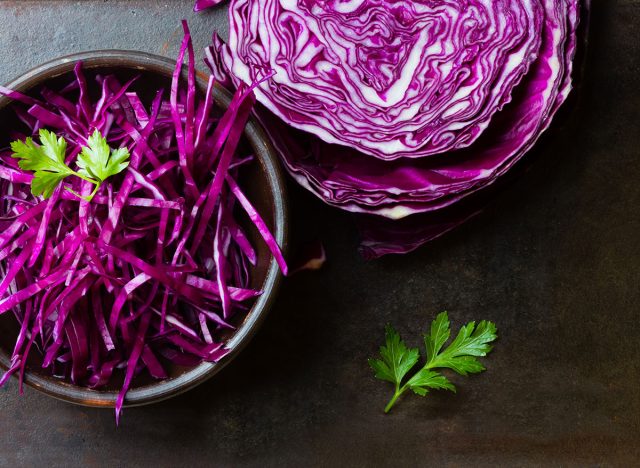
According to Tammy Lakatos Shames, RDN, CDN, CFT, and Lyssie Lakatos, RDN, CDN, CFT, also known as The Nutrition Twins, red and purple cabbage is one of the best vegetables to eat for longevity.
"This cabbage is in the cruciferous family, which means it's a potent source of sulfur-containing antioxidants called glucosinolates, which research has found, along with anthocyanins, another powerful compound in cabbage, to help reduce the risk of heart disease, cancer, arthritis, and neurogenerative disease," say The Nutrition Twins.
"Adding to its heart-protective benefits, cabbage is also a good source of phytosterols and fiber, which helps to lower cholesterol," they add. "Phytosterols and fiber are not only good for the heart but are key players in digestive health, helping to keep you regular, while also fueling the good bacteria in the microbiome. And given that digestive health is central for every aspect of health and longevity, it's just one more reason cabbage promotes healthy aging."
Mushrooms
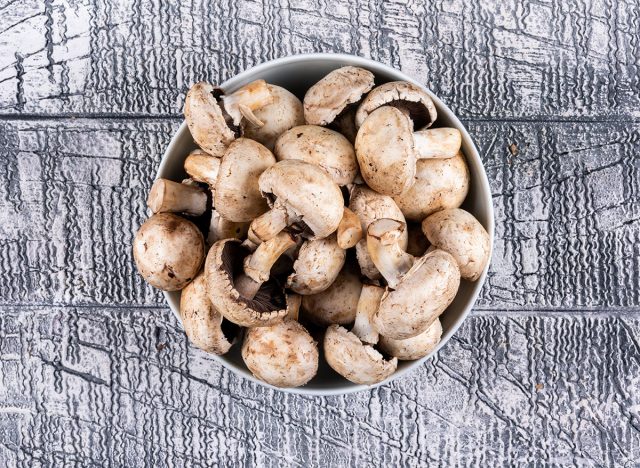
Not everyone likes the taste of mushrooms, but if you're a fan of cooking with funghi, you'll be happy to know that it comes with aging benefits.
"Varieties such as shiitake, reishi, and maitake are especially noted for their potential to support immune health due to their high content of beta-glucans—complex sugars known to stimulate the immune system," says Lauren Manaker, MS, RDN. "Mushrooms are also a source of powerful antioxidants like selenium and ergothioneine, which help protect cells from damage and reduce inflammation."
The Nutrition Twins agree, saying that "Mushrooms are longevity powerhouses." They note, "Many studies have found mushrooms protect against mild cognitive impairment (MCI), while additional studies have found the polyphenols and antioxidants in mushrooms protect against Alzheimer's disease and other neurodegenerative diseases."
The Twins add that mushrooms can help support a healthy gut, too. "They contain polysaccharides that are a prebiotic fiber and allow the good bacteria (probiotics) to flourish," they say. "A healthy microbiome affects everything from mood to autoimmunity to obesity and everything in between."
Need a reminder to eat some mushrooms during your meals? Manaker suggests making Mondays a "Mushroom Monday to make a habit of eating mushrooms in your longevity-supporting diet."
Blueberries
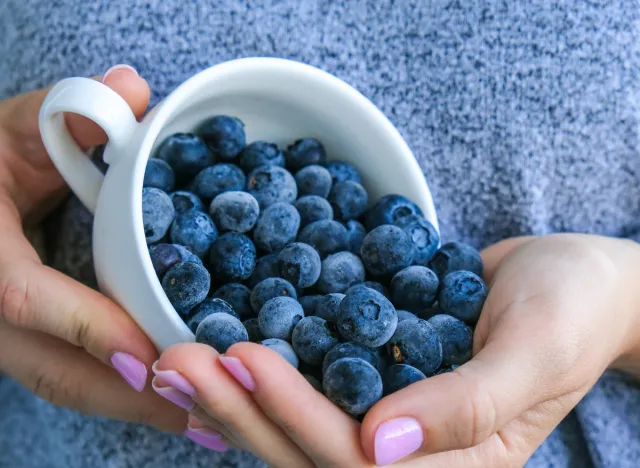
Blueberries offer health benefits in every way imaginable, with one major benefit being their contribution to healthy aging.
"Often hailed as a superfood, blueberries are rich in antioxidants, particularly anthocyanins, which may contribute to longevity," says Manaker. "These powerful compounds combat oxidative stress and inflammation, conditions linked to chronic diseases and aging. Incorporating blueberries into your diet can enhance your health in the short term and may also promote a longer, healthier life."
Research published in Gerontology also found that blueberry consumption can help reduce the risk of age-related neurological disorders like Alzheimer's, dementia, and Parkinson's disease.
Broccoli
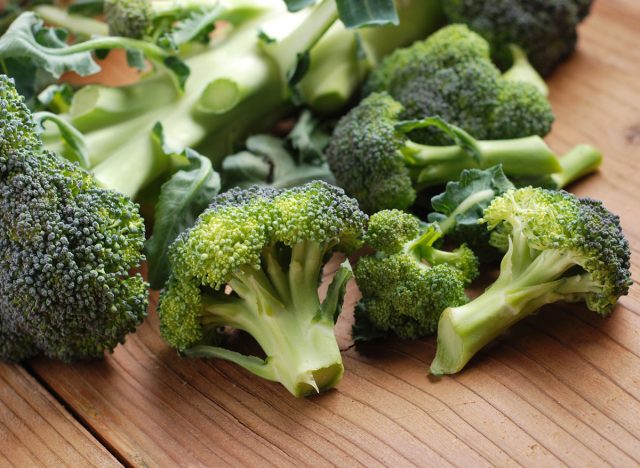
If you like broccoli, throw some in as a side dish to your next meal, because this vegetable has been linked to better longevity.
According to Manaker, "Broccoli is loaded with fiber, vitamins C and K, iron, and a host of other antioxidants that have been shown to decrease the risk of chronic diseases like heart disease and cancer."
She also adds, "One of its key components, sulforaphane, is especially noteworthy for its potential to enhance the body's detoxification processes and protect against cellular damage."
Beets
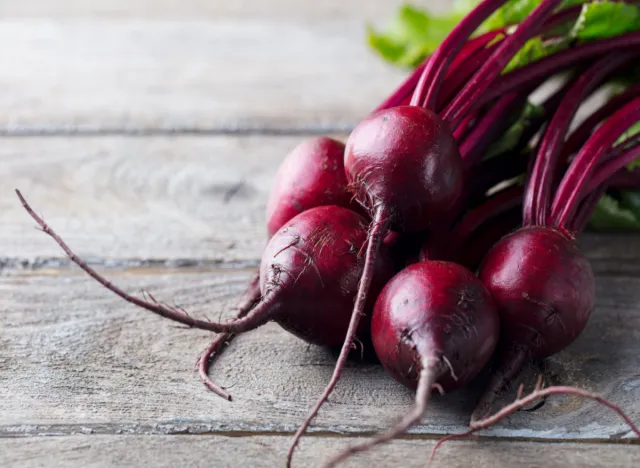
Beets often get overlooked, but don't let that fool you. According to Manaker, these "are another powerhouse when it comes to foods that bolster longevity."
"These vibrant, earthy root vegetables are a treasure trove of nutrients, including fiber, folate (vitamin B9), manganese, potassium, iron, and vitamin C," she says. "Beets and their juice have been associated with numerous health benefits, such as improved blood flow, lower blood pressure, and increased exercise performance, thanks to their high content of nitrates. These compounds are converted into nitric oxide in the body, enhancing blood vessel dilation and leading to better circulation and oxygen delivery throughout the body."
And if that wasn't enough, Manaker notes that the color pigments in beets carry benefits, too. "These pigments, known as betalains, give beets their rich color and have strong anti-inflammatory and antioxidant properties, offering protection against oxidative stress and chronic diseases."
Mangoes
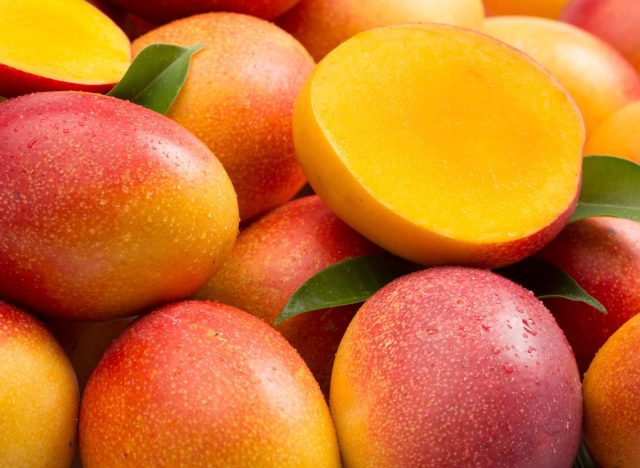
"Mangoes, with their sweet, tropical flavor, are not just a delight to the taste buds but also a boon for longevity," says Manaker. But what makes these summertime fruits so beneficial to your aging process?
"These succulent fruits are packed with vitamins A and C, which play a crucial role in immune function and skin health," says Manaker, "and the high levels of antioxidants found in mangos, such as mangiferin, quercetin, and gallic acid, contribute to their ability to combat oxidative stress and inflammation, two significant factors associated with aging and chronic diseases."
She also notes that the fiber in mango can "support digestive health and help in maintaining a healthy gut microbiome, an essential component for overall health and longevity."
Avocado
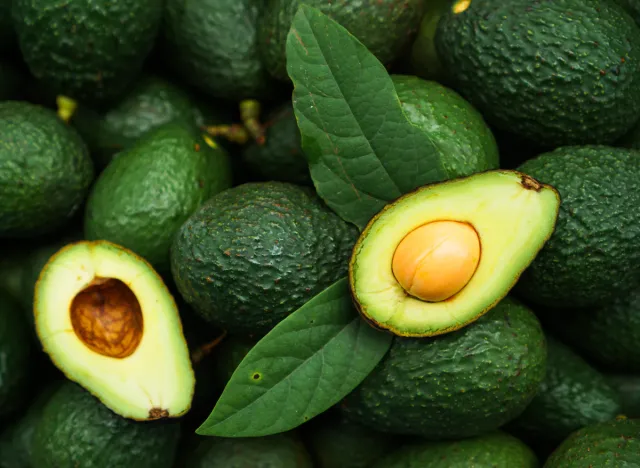
Avocados are powerful superfoods that have been linked to a myriad of health benefits, many of which can specifically help with healthy aging and longevity.
For instance, avocados are rich in fiber, which can help reduce the risk of heart disease and improve gut health. Research has also shown that avocados can help reduce LDL cholesterol (the "bad" kind), which can directly help reduce your risk of heart disease, as well as reduce chronic inflammation. And lastly, avocados are rich in nutrients and antioxidants that can help lower the risk of neurodegenerative diseases like Parkinson's, Alzheimer's, and dementia.
Spinach
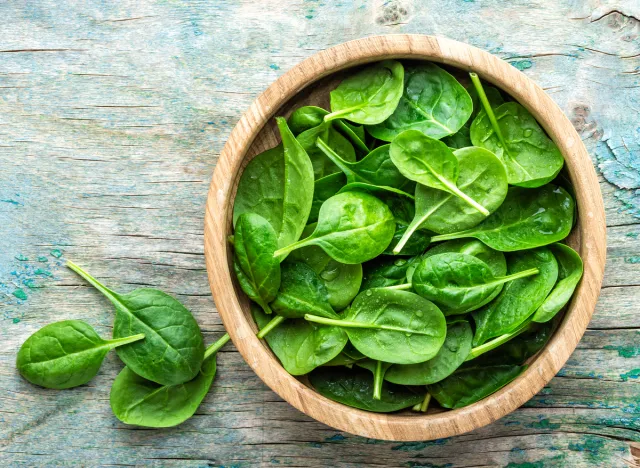
When you're looking for nutrient-dense foods, leafy greens (think spinach, kale, arugula, etc.) are always a good answer.
For starters, leafy greens in general have been linked to slower cognitive decline because of their nutrients and bioactive compounds like lutein, beta-carotene, nitrate, and folate. But spinach, specifically, has also been found to possibly help lower blood pressure because of its higher potassium levels. In addition to that, one study also found that eating spinach daily helped increase lutein levels, which can directly help reduce the risk of macular degeneration—an age-related condition of the eyes.
Kale
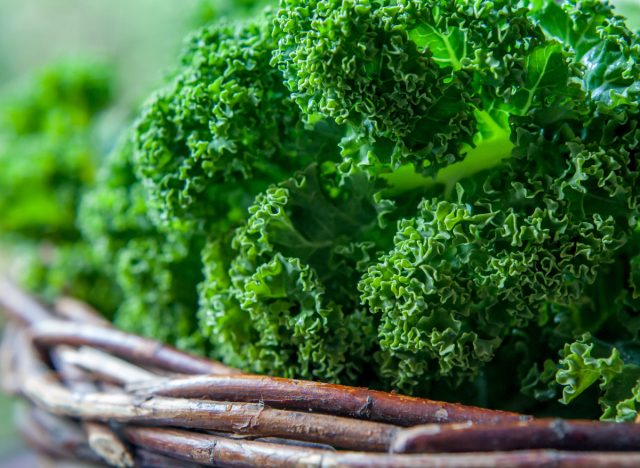
Speaking of leafy greens, kale is another excellent choice for a vegetable that can help with healthy aging. As we mentioned with spinach, leafy greens (which includes kale) have been found to help reduce and slow down age-related cognitive decline because of their powerful nutrient content.
Leafy greens like kale have also been found to help reduce the risk of cardiovascular disease, and one study found that kale juice could help reduce the risk of coronary heart disease.
Strawberries
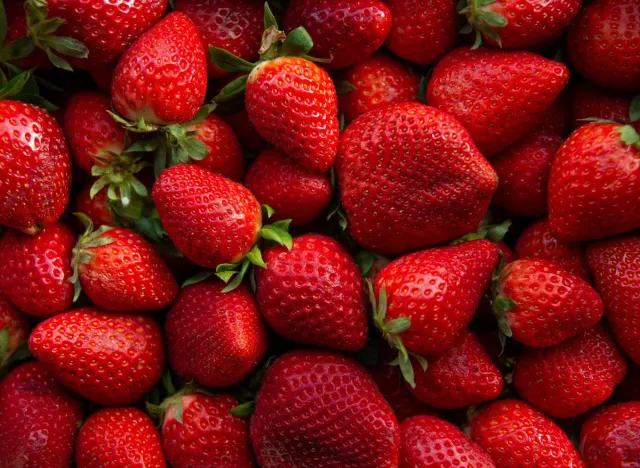
We've already discussed blueberries and their ability to help with healthy aging, but you can also throw strawberries into the mix of longevity fruits. According to research from the British Journal of Nutrition, adding strawberries to your diet may be able to help with areas of age-related cognitive decline, like memory.
Another study found that strawberry powder could help improve memory and depressive symptoms in some middle-aged men and women.
- Source: Connolly EL, Sim M, Travica N, Marx W, Beasy G, Lynch GS, Bondonno CP, Lewis JR, Hodgson JM, Blekkenhorst LC. Glucosinolates From Cruciferous Vegetables and Their Potential Role in Chronic Disease: Investigating the Preclinical and Clinical Evidence. Front Pharmacol. 2021 Oct 26;12:767975. doi: 10.3389/fphar.2021.767975. PMID: 34764875; PMCID: PMC8575925.
- Source: Connolly EL, Bondonno CP, Sim M, Radavelli-Bagatini S, Croft KD, Boyce MC, James AP, Clark K, Anokye R, Bondonno NP, Woodman RJ, Devine A, Gan SK, Schultz CJ, Mithen RF, Lewis JR, Hodgson JM, Blekkenhorst LC. A randomised controlled crossover trial investigating the short-term effects of different types of vegetables on vascular and metabolic function in middle-aged and older adults with mildly elevated blood pressure: the VEgetableS for vaScular hEaLth (VESSEL) study protocol. Nutr J. 2020 May 12;19(1):41. doi: 10.1186/s12937-020-00559-3. PMID: 32398091; PMCID: PMC7218618.
- Source: Mirończuk-Chodakowska I, Kujawowicz K, Witkowska AM. Beta-Glucans from Fungi: Biological and Health-Promoting Potential in the COVID-19 Pandemic Era. Nutrients. 2021 Nov 6;13(11):3960. doi: 10.3390/nu13113960. PMID: 34836215; PMCID: PMC8623785.
- Source: Feng, Lei et al. ‘The Association Between Mushroom Consumption and Mild Cognitive Impairment: A Community-Based Cross-Sectional Study in Singapore’. 1 Jan. 2019 : 197 – 203.
- Source: Liuzzi GM, Petraglia T, Latronico T, Crescenzi A, Rossano R. Antioxidant Compounds from Edible Mushrooms as Potential Candidates for Treating Age-Related Neurodegenerative Diseases. Nutrients. 2023 Apr 15;15(8):1913. doi: 10.3390/nu15081913. PMID: 37111131; PMCID: PMC10145943.
- Source: Kalt W, Cassidy A, Howard LR, Krikorian R, Stull AJ, Tremblay F, Zamora-Ros R. Recent Research on the Health Benefits of Blueberries and Their Anthocyanins. Adv Nutr. 2020 Mar 1;11(2):224-236. doi: 10.1093/advances/nmz065. PMID: 31329250; PMCID: PMC7442370.
- Source: Liguori I, Russo G, Curcio F, Bulli G, Aran L, Della-Morte D, Gargiulo G, Testa G, Cacciatore F, Bonaduce D, Abete P. Oxidative stress, aging, and diseases. Clin Interv Aging. 2018 Apr 26;13:757-772. doi: 10.2147/CIA.S158513. PMID: 29731617; PMCID: PMC5927356.
- Source: Barbara Shukitt-Hale; Blueberries and Neuronal Aging. Gerontology 1 October 2012; 58 (6): 518–523. https://doi.org/10.1159/000341101
- Source: McRae MP. Dietary Fiber Is Beneficial for the Prevention of Cardiovascular Disease: An Umbrella Review of Meta-analyses. J Chiropr Med. 2017 Dec;16(4):289-299. doi: 10.1016/j.jcm.2017.05.005. Epub 2017 Oct 25. PMID: 29276461; PMCID: PMC5731843.
- Source: Morelli MB, Gambardella J, Castellanos V, Trimarco V, Santulli G. Vitamin C and Cardiovascular Disease: An Update. Antioxidants (Basel). 2020 Dec 3;9(12):1227. doi: 10.3390/antiox9121227. PMID: 33287462; PMCID: PMC7761826.
- Source: Vik H. Highlighting The Substantial Body Of Evidence Confirming The Importance Of Vitamin K2 As A Cardio-Support Nutrient, And How The Right K2 Makes All The Difference. Integr Med (Encinitas). 2019 Dec;18(6):24-28. PMID: 32549853; PMCID: PMC7238900.
- Source: de Valk B, Marx JJM. Iron, Atherosclerosis, and Ischemic Heart Disease. Arch Intern Med. 1999;159(14):1542–1548. doi:10.1001/archinte.159.14.1542
- Source: Baralić, K.; Živanović, J.; Marić, Đ.; Bozic, D.; Grahovac, L.; Antonijević Miljaković, E.; Ćurčić, M.; Buha Djordjevic, A.; Bulat, Z.; Antonijević, B.; et al. Sulforaphane—A Compound with Potential Health Benefits for Disease Prevention and Treatment: Insights from Pharmacological and Toxicological Experimental Studies. Antioxidants 2024, 13, 147. https://doi.org/10.3390/antiox13020147
- Source: FoodData Central. (n.d.-cw). https://fdc.nal.usda.gov/fdc-app.html#/food-details/169145/nutrients
- Source: Clifford T, Howatson G, West DJ, Stevenson EJ. The potential benefits of red beetroot supplementation in health and disease. Nutrients. 2015 Apr 14;7(4):2801-22. doi: 10.3390/nu7042801. PMID: 25875121; PMCID: PMC4425174.
- Source: Stanaway L, Rutherfurd-Markwick K, Page R, Ali A. Performance and Health Benefits of Dietary Nitrate Supplementation in Older Adults: A Systematic Review. Nutrients. 2017 Oct 27;9(11):1171. doi: 10.3390/nu9111171. PMID: 29077028; PMCID: PMC5707643.
- Source: Rahimi P, Abedimanesh S, Mesbah-Namin SA, Ostadrahimi A. Betalains, the nature-inspired pigments, in health and diseases. Crit Rev Food Sci Nutr. 2019;59(18):2949-2978. doi: 10.1080/10408398.2018.1479830. Epub 2018 Nov 18. PMID: 29846082.
- Source: FoodData Central. (n.d.-cx). https://fdc.nal.usda.gov/fdc-app.html#/food-details/169910/nutrients
- Source: Carr AC, Maggini S. Vitamin C and Immune Function. Nutrients. 2017 Nov 3;9(11):1211. doi: 10.3390/nu9111211. PMID: 29099763; PMCID: PMC5707683.
- Source: Pullar JM, Carr AC, Vissers MCM. The Roles of Vitamin C in Skin Health. Nutrients. 2017 Aug 12;9(8):866. doi: 10.3390/nu9080866. PMID: 28805671; PMCID: PMC5579659.
- Source: Ghosh, T.S., Shanahan, F. & O’Toole, P.W. The gut microbiome as a modulator of healthy ageing. Nat Rev Gastroenterol Hepatol 19, 565–584 (2022). https://doi.org/10.1038/s41575-022-00605-x
- Source: McRae MP. Dietary Fiber Is Beneficial for the Prevention of Cardiovascular Disease: An Umbrella Review of Meta-analyses. J Chiropr Med. 2017 Dec;16(4):289-299. doi: 10.1016/j.jcm.2017.05.005. Epub 2017 Oct 25. PMID: 29276461; PMCID: PMC5731843.
- Source: Fu J, Zheng Y, Gao Y, Xu W. Dietary Fiber Intake and Gut Microbiota in Human Health. Microorganisms. 2022 Dec 18;10(12):2507. doi: 10.3390/microorganisms10122507. PMID: 36557760; PMCID: PMC9787832.
- Source: Wang L, Tao L, Hao L, Stanley TH, Huang KH, Lambert JD, Kris-Etherton PM. A Moderate-Fat Diet with One Avocado per Day Increases Plasma Antioxidants and Decreases the Oxidation of Small, Dense LDL in Adults with Overweight and Obesity: A Randomized Controlled Trial. J Nutr. 2020 Feb 1;150(2):276-284. doi: 10.1093/jn/nxz231. PMID: 31616932; PMCID: PMC7373821.
- Source: Cheng FW, Ford NA, Wood AC, Tracy R. Avocado consumption and markers of inflammation: results from the Multi-Ethnic Study of Atherosclerosis (MESA). Eur J Nutr. 2023 Aug;62(5):2105-2113. doi: 10.1007/s00394-023-03134-8. Epub 2023 Mar 22. PMID: 36947255; PMCID: PMC10349765.
- Source: Ameer K. Avocado as a Major Dietary Source of Antioxidants and Its Preventive Role in Neurodegenerative Diseases. Adv Neurobiol. 2016;12:337-54. doi: 10.1007/978-3-319-28383-8_18. PMID: 27651262.
- Source: Morris MC, Wang Y, Barnes LL, Bennett DA, Dawson-Hughes B, Booth SL. Nutrients and bioactives in green leafy vegetables and cognitive decline: Prospective study. Neurology. 2018 Jan 16;90(3):e214-e222. doi: 10.1212/WNL.0000000000004815. Epub 2017 Dec 20. PMID: 29263222; PMCID: PMC5772164.
- Source: Jonvik, K. L., Nyakayiru, J., Pinckaers, P. J. M., Senden, J. M., Van Loon, L. J. C., & Verdijk, L. B. (2016). Nitrate-Rich vegetables increase plasma nitrate and nitrite concentrations and lower blood pressure in healthy adults. the Journal of Nutrition/the Journal of Nutrition, 146(5), 986–993. https://doi.org/10.3945/jn.116.229807
- Source: Ozawa Y, Nagai N, Suzuki M, Kurihara T, Shinoda H, Watanabe M, Tsubota K. [Effects of Constant Intake of Lutein-rich Spinach on Macular Pigment Optical Density: a Pilot Study]. Nippon Ganka Gakkai Zasshi. 2016 Jan;120(1):41-8. Japanese. PMID: 26950968.
- Source: Morris MC, Wang Y, Barnes LL, Bennett DA, Dawson-Hughes B, Booth SL. Nutrients and bioactives in green leafy vegetables and cognitive decline: Prospective study. Neurology. 2018 Jan 16;90(3):e214-e222. doi: 10.1212/WNL.0000000000004815. Epub 2017 Dec 20. PMID: 29263222; PMCID: PMC5772164.
- Source: Pollock RL. The effect of green leafy and cruciferous vegetable intake on the incidence of cardiovascular disease: A meta-analysis. JRSM Cardiovasc Dis. 2016 Aug 1;5:2048004016661435. doi: 10.1177/2048004016661435. PMID: 27540481; PMCID: PMC4973479.
- Source: Kim SY, Yoon S, Kwon SM, Park KS, Lee-Kim YC. Kale juice improves coronary artery disease risk factors in hypercholesterolemic men. Biomed Environ Sci. 2008 Apr;21(2):91-7. doi: 10.1016/S0895-3988(08)60012-4. PMID: 18548846.
- Source: Miller MG, Thangthaeng N, Rutledge GA, Scott TM, Shukitt-Hale B. Dietary strawberry improves cognition in a randomised, double-blind, placebo-controlled trial in older adults. British Journal of Nutrition. 2021;126(2):253-263. doi:10.1017/S0007114521000222
- Source: Krikorian, R.; Shidler, M.D.; Summer, S.S. Early Intervention in Cognitive Aging with Strawberry Supplementation. Nutrients 2023, 15, 4431. https://doi.org/10.3390/nu15204431









